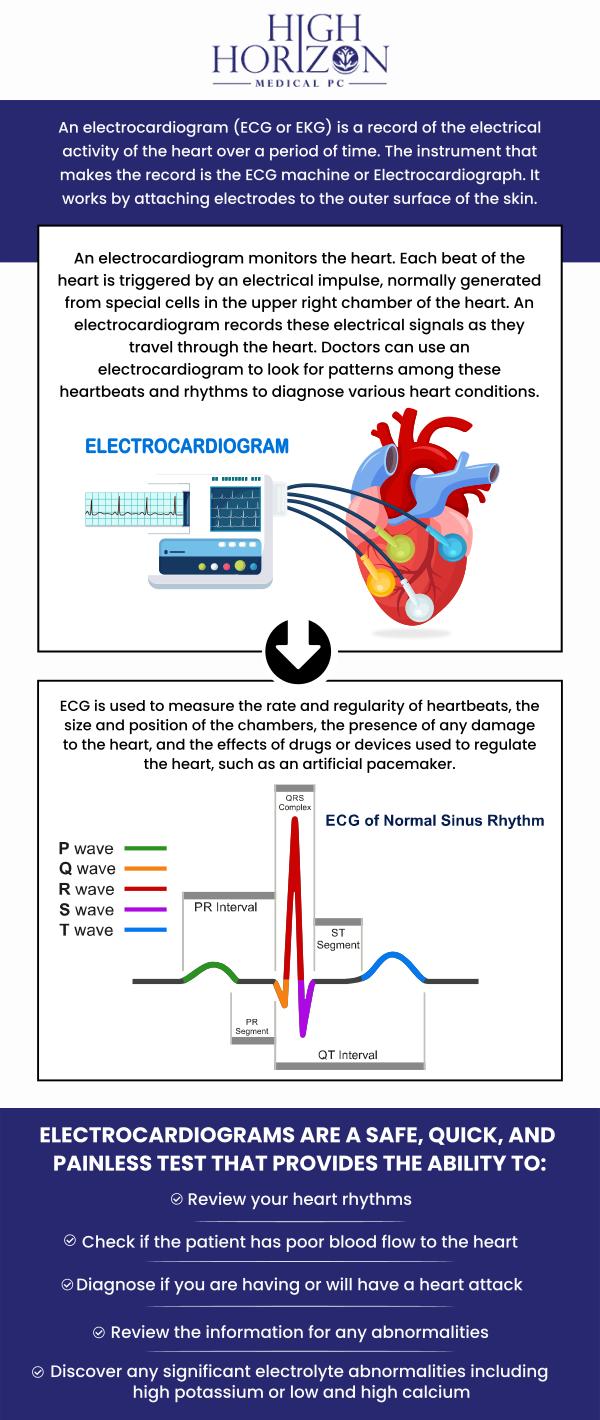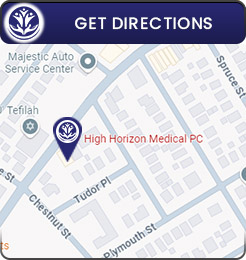EKG Testing Clinic in West Hempstead, NY
An EKG, or electrocardiogram, is a simple and quick examination that monitors electrical activity in your heart. An EKG is used to diagnose arrhythmias (irregular heartbeats), heart attacks, and other heart problems. If you have heart-related symptoms, don’t wait! Dr. Ali Tabarroki, MD, and his team at High Horizon provide convenient EKG testing for a quick and simple test to evaluate your heart health. For more information, contact us or schedule an appointment online. We are conveniently located at 396 Hempstead Avenue, West Hempstead, NY 11552.


Table of Contents:
What does an EKG check for?
Is EKG and ECG the same things?
What happens during the EKG test?
Can primary care do an EKG test?
At High Horizon in West Hempstead, NY, we are proud to offer EKG testing services to our community. Our clinic is designed to provide timely and reliable cardiac care without the need for an appointment. EKG testing is a crucial diagnostic tool for detecting heart conditions and monitoring cardiac health. With our state-of-the-art equipment and experienced medical professionals, we ensure that each patient receives accurate and prompt results. Whether you’re experiencing symptoms or seeking routine cardiovascular assessment, High Horizon is here to support your heart health with convenience and professionalism.
An electrocardiogram (EKG) checks for various heart-related conditions by recording the electrical activity of the heart over some time. This non-invasive test can detect arrhythmias, which are irregular heartbeats that may indicate underlying heart conditions. It can also identify ischemia or reduced blood flow to the heart muscles, which is a critical indicator of potential heart attacks or other coronary artery diseases. Additionally, an EKG can reveal heart enlargement, which might suggest high blood pressure or other structural issues. By analyzing the timing and duration of each electrical phase in your heartbeat, an EKG provides comprehensive data that can help diagnose and monitor numerous cardiac conditions, ensuring timely and appropriate treatment.
Yes, EKG and ECG refer to the same diagnostic test used to measure the electrical activity of the heart. The term ECG stands for electrocardiogram, deriving from the Greek word “kardia” meaning “heart,” while EKG is an alternative abbreviation taken from the German word “Elektrokardiogramm.” Both terms are used interchangeably in the medical field to describe the process of recording the heart’s electrical signals through electrodes attached to the skin. This test is essential for diagnosing various heart conditions, such as arrhythmias, heart attacks, and other cardiac anomalies. Despite the difference in abbreviations, the procedure, functionality, and purpose remain identical, offering critical insights into heart health through the analysis of electrical impulses generated by the heart.
During an EKG test, a patient is asked to lie down on an examination table while several small, sticky electrodes are attached to their skin in strategic locations, such as the chest, arms, and legs. These electrodes are connected to an EKG machine that records the heart’s electrical activity. The placement of the electrodes ensures a comprehensive view of the heart’s activity from various angles. Once the electrodes are in place, the patient is instructed to remain still and breathe normally while the machine records the electrical impulses for a few minutes. The test is painless and typically takes about 5 to 10 minutes to complete. As the EKG machine collects data, it produces a series of waveforms that represent the timing and intensity of the electrical signals in the heart. A healthcare professional then analyzes these waveforms to look for any irregularities, such as unusual heart rhythms, signs of previous heart attacks, or other cardiac abnormalities. The results are usually available immediately, allowing for prompt discussion and intervention if necessary.
Yes, primary care can perform an EKG test, offering a convenient option for individuals who may require immediate cardiac assessment without the need for a prior appointment. The primary care centers are equipped with the necessary state-of-the-art EKG machines and staffed by trained healthcare professionals capable of conducting the test efficiently. The process at primary care is usually swift and seamless; patients can present themselves for an EKG, where they will undergo the same standardized procedure as in any other medical facility. This accessibility is especially beneficial for individuals experiencing unexpected symptoms such as chest pain, palpitations, or shortness of breath that may indicate potential heart issues. Since primary care centers provide prompt service, they play a crucial role in early detection and timely management of various heart conditions. The ability to receive care without an appointment ensures that patients get the essential treatment they need without delays, potentially preventing more severe complications by enabling quick evaluation and intervention based on the EKG findings.
At High Horizon, your heart health is our top priority. Our commitment to providing accessible and reliable cardiac care ensures that you receive the attention and diagnostic services you need without delay. If you have any concerns about your heart health or if you require an EKG test, do not hesitate to visit us. Our expert team is here to support you with the highest quality care in a convenient setting. For more information or to schedule an appointment, please contact us or book an appointment online through our website. Trust High Horizon for all your cardiac diagnostic needs. We are conveniently located at 396 Hempstead Avenue, West Hempstead, NY 11552. We serve patients from West Hempstead, NY, Mineola NY, Lynbrook NY, Valley Stream NY, Uniondale NY, Rockville Centre NY, Elmont NY, Queens NY, New Hyde Park NY, and surrounding areas.


Additional Services You May Need
▸ Primary Care
▸ Weight Loss
▸ Urgent Care
▸ HRT
▸ X-Ray
▸ Physical Exams
▸ Immunization Clinic
▸ Electrocardiogram (EKG)
▸ Rapid Lab Tests and Screening





